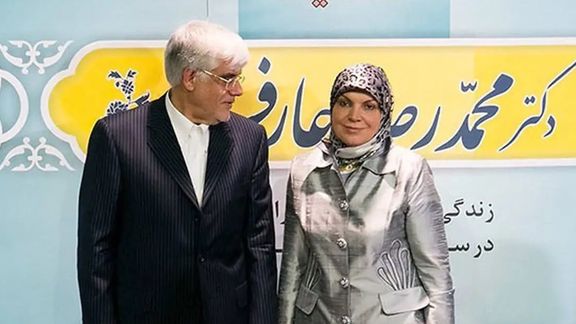Pezeshkian’s vice-president accused of ‘misogyny’

Vice-President Mohammad-Reza Aref has been accused of ‘misogyny’ after saying the Iranian society is not ready to give women leadership roles.

Vice-President Mohammad-Reza Aref has been accused of ‘misogyny’ after saying the Iranian society is not ready to give women leadership roles.
“Our society is not yet psychologically ready for women’s leadership,” Aref remarked in a video clip released by several media outlets during a ceremony bidding farewell to outgoing Women’s and Family Affairs Deputy Ensieh Khazali and introducing her successor, Zahra Behrouz-Azar.
The controversial remark was made in response to Khazali who criticized the reform-oriented Pezeshkian’s government for nominating only one female minister although there had been no female ministers in Ebrahim Raisi’s hardline-dominated government.
Some media and social media users interpreted Aref’s remarks as an excuse not to use more women in the higher echelons of Pezeshkian’s government that was supposed to be more reform oriented. Many also accused him of ‘misogyny”.
A longer version of the speech was later released, which suggested that Aref was actually criticizing the limited role of women in the government, rather than endorsing it. “Look at the indicators of girls versus boys’ academic progress. I’m sure our girls are ahead in most areas,” he stated, adding that the government's ideal is "no discrimination between men and women."
Aref also appeared to be expressing a concern that hardliners may not accept Farzaneh Sadeghi-Malvajerd, Pezeshkian’s only female cabinet nominee. “Let us get a vote of confidence for this one and later use [more women in such posts],” he says in the fuller version.
Sadeghi-Malvajerd, 55, who Pezeshkian has nominated to lead the Ministry of Roads and Construction is currently a deputy minister. In his speech, Aref said those opposed to her appointment ask whether a female roads and construction minister will be required to visit road construction sites.
If approved by the parliament, she will be the second female minister in the more than four-decade-long history of the Islamic Republic where not only politicians but also some influential Shia religious ‘sources of emulation’ strongly oppose giving women leading roles in the government.
Many, including the so-called ‘Islamic feminists’ oppose ‘patriarchal interpretations of Sharia’ which they say prevent women from running for president or female judges from presiding in courts of justice and the unwritten rules that do not allow women to be appointed to positions of power in the government.
Iranian women have also been fighting for decades against highly discriminatory laws, including family and inheritance laws, that are based on Sharia or only Shia tradition.
Some critics such as journalist Elahe Khosravi who believes Aref is oblivious to the Woman, Life, Freedom movement say the Vice-President has unjustly blamed the “society” and accused people of prejudice instead of admitting that it is the ruling establishment that has deprived women of their rights and opposes their progress.
“Aref is right. Our society is not prepared for women’s leadership because we are still stuck with the Islamic Republic and the repugnant absolute rule of the Islamic jurist,” student and women’s rights activist Motahare Goonei tweeted. A woman who demands more than what the “patriarchal system allows” is considered a criminal and punished, she said.
Another critic on X accused Aref of lying about the Iranian society. “Who says the society does not accept women’s leadership? He has put forth a false premise and lied about the people and the society. It would be okay if he said clerics oppose it as the society and people have no objection to women’s leadership.”
During the presidential debates, Pezeshkian criticized hardliners in the parliament of blocking a Rouhani administration bill to stop violence against women, discrimination against women, and harsh enforcement of hijab and promised to use more women in his government.